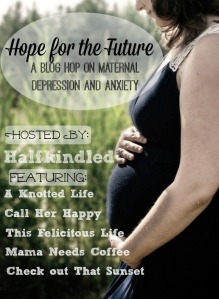“This is what I’ve always wanted! So why am I unhappy?”
This was my dominant thought when I was postpartum with my first child. My husband and I both came from large families, and we had joyfully planned for a life like our parents’: lots of kids, starting right away, and a stay-at-home mom. I felt shocked, angry, guilty, and disillusioned when my first year at home with my baby was horrible.
To begin with, I was bored. I didn’t really know what to do with a newborn besides nurse him, and I didn’t know how to keep busy while I was holding him, and I felt guilty whenever I put him down. And I do mean every time. He would be sitting there happily, staring at the pictures on the wall, and I would look at him and think, “I’m a bad mother.” Looking back, these were two tell-tale signs of depression: irrational guilt, and uncontrollable negative thoughts flooding my mind. And always in the background there was the meta-guilt of my inability to enjoy motherhood the way I had pictured.
Two years later, my dread of another postpartum like that one outweighed my fear of pills, and I agreed to try antidepressants a few days after I gave birth to my second baby. I clearly remember my ten-day checkup at the midwives’, when they asked me about my depression and I realized that I hadn’t cried AT ALL since giving birth. Even for someone not prone to depression, that’s practically a miracle! (I’m not trying to recommend antidepressants as a cure-all for everyone, but I do hope that anyone in this situation will consider them as a real option.) The second step, in my case, was therapy. The greatest gift my therapist gave me was to help sort out an identity for myself, separate from that of a wife or mother. This allowed me to invest some energy into finding fulfillment outside of the sphere of motherhood, which is crucial. If you’re at all prone to depression, anxiety, guilt, self-comparison, or low self-esteem (that covers just about everyone, right?), investing your self-worth entirely into some ideal of motherhood is guaranteed to invite depression.
Not everyone’s experience will be like mine, and therapy and antidepressants may not be the right course for everyone; but the important thing is to realize that something external must be done about your depression. You can not pray or will your depression away, because its origin is not in your failings. Maternal depression can feel like it’s your fault, because motherhood seems like something that should come naturally and easily; but this is a fallen world, and what’s natural is not always easy. Even if motherhood is what you’ve always wanted, there is nothing wrong with needing help.
********************************************************
Thank you so much to Katherine at Half Kindled for hosting this much-needed conversation! I’m really thrilled to be a part of this. Please read what my fellow bloggers have contributed at A Knotted Life, Call Her Happy, Half Kindled, This Felicitous Life, and Mama Needs Coffee.
********************************************************
A few resources I have found helpful:
- therapy: ask your midwife or OB/GYN for a recommendation. They may be able to give you the name of a therapist who’s been recommended by other patients in their practice.
- self-help books: I really appreciated Gregory Popcak’s book, God Help Me! This Stress Is Driving Me Crazy!, which is an extremely helpful and practical mix of tried-and-true psychotherapy techniques and spiritual advice and encouragement. (I have a few reviews of Popcak’s books in the works.) I haven’t read Aaron Kheriaty’s Catholic Guide to Depression yet, but it’s been recommended to me by so many trusted friends that I feel comfortable passing it on to you. I hope to tackle it soon and review it for you. I find this blurb extremely encouraging: “…the confessional can’t cure neuroses, nor can the couch forgive sins. Healing comes only when we integrate the legitimate discoveries of modern psychology and pharmacology with spiritual direction and the sacraments….”
- NaPro technology. I know many people who have been helped by NaPro, which specializes in helping women overcome infertility, postpartum depression, and other reproductive problems through natural and morally permissible means, specifically through the Creighton method of natural family planning. I know a few people whose postpartum depression was linked to low progesterone, and NaPro doctors were able to prescribe progesterone supplements that changed their lives. Here is a website for locating NaPro doctors in your area.
- For those of you who are nervous about antidepressants during pregnancy or breastfeeding, I found these studies from Mass. General Hospital, which were given to me by my midwife, extremely comforting.
